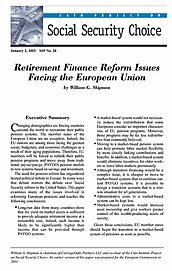The need for pension reform has engendered heated political debate in Europe. In many ways that debate mirrors the debate over Social Security reform in the United States. This paper examines many of the issues involved in reforming European pensions and reaches the following conclusions:
- Long-run data from many countries show that the yield on market assets is sufficient to provide adequate retirement income at a reasonable cost. Indeed, such income is likely to be significantly higher than income that can be provided through PAYGO systems.
- A market-based system would not necessarily reduce the redistribution that some Europeans consider an important characteristic of EU pension programs. Moreover, those programs may be far less redistributive than commonly believed.
- Moving to a market-based pension system can help promote labor market flexibility by more closely linking contributions and benefits. In addition, a market-based system would eliminate incentives for older workers to leave labor markets prematurely.
- Although transition financing would be a complex issue, it is cheaper to move to market-based systems than to continue current PAYGO systems. It is possible to design a transition scenario that is a winwin situation for all generations.
- Administrative costs in a market-based system can be kept low.
- Market-based systems would increase asset ownership and give workers greater control of the wealth-producing assets of society.
Given those conclusions, EU member states should begin the transition to a market-based system of pensions as soon as possible.


